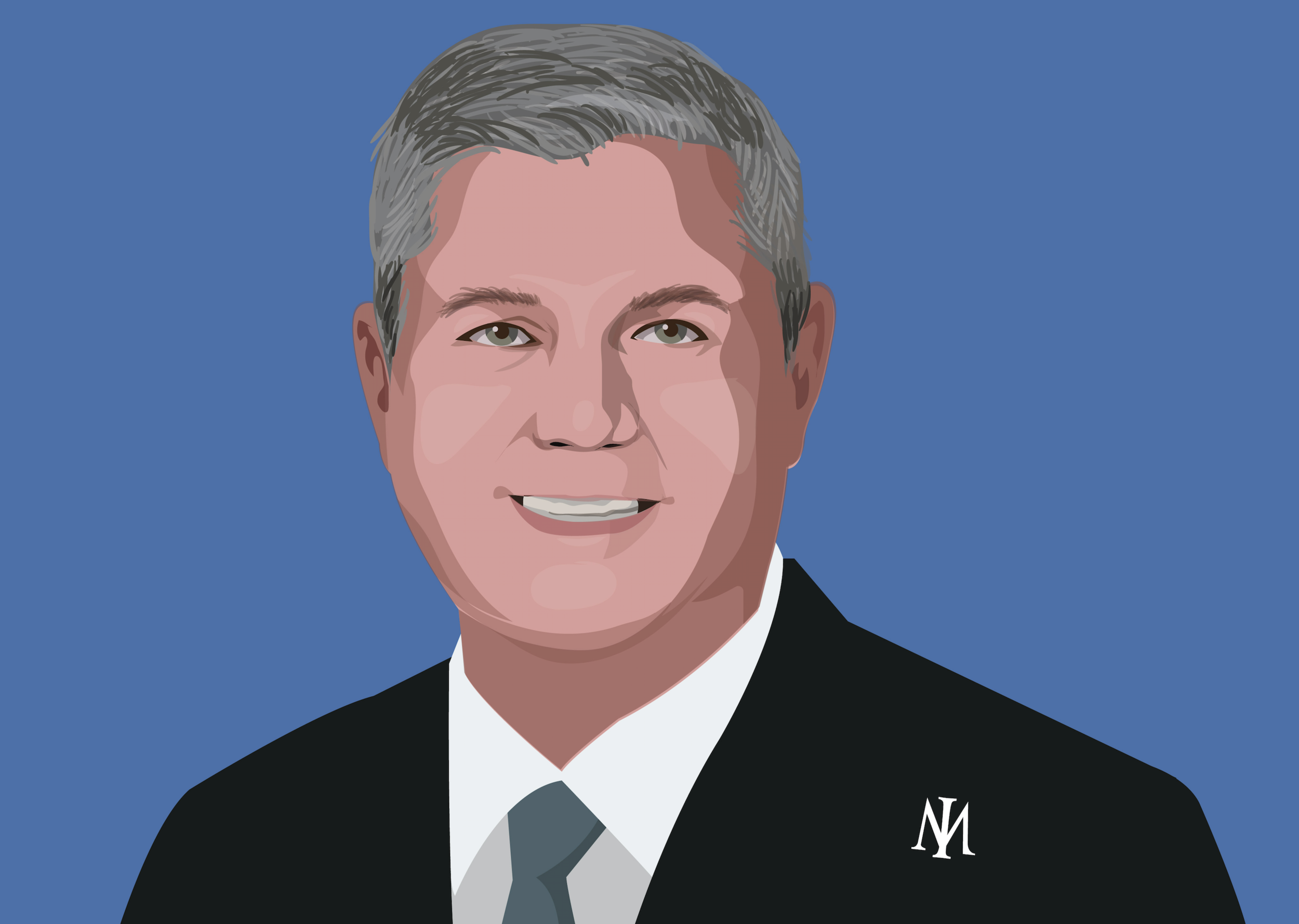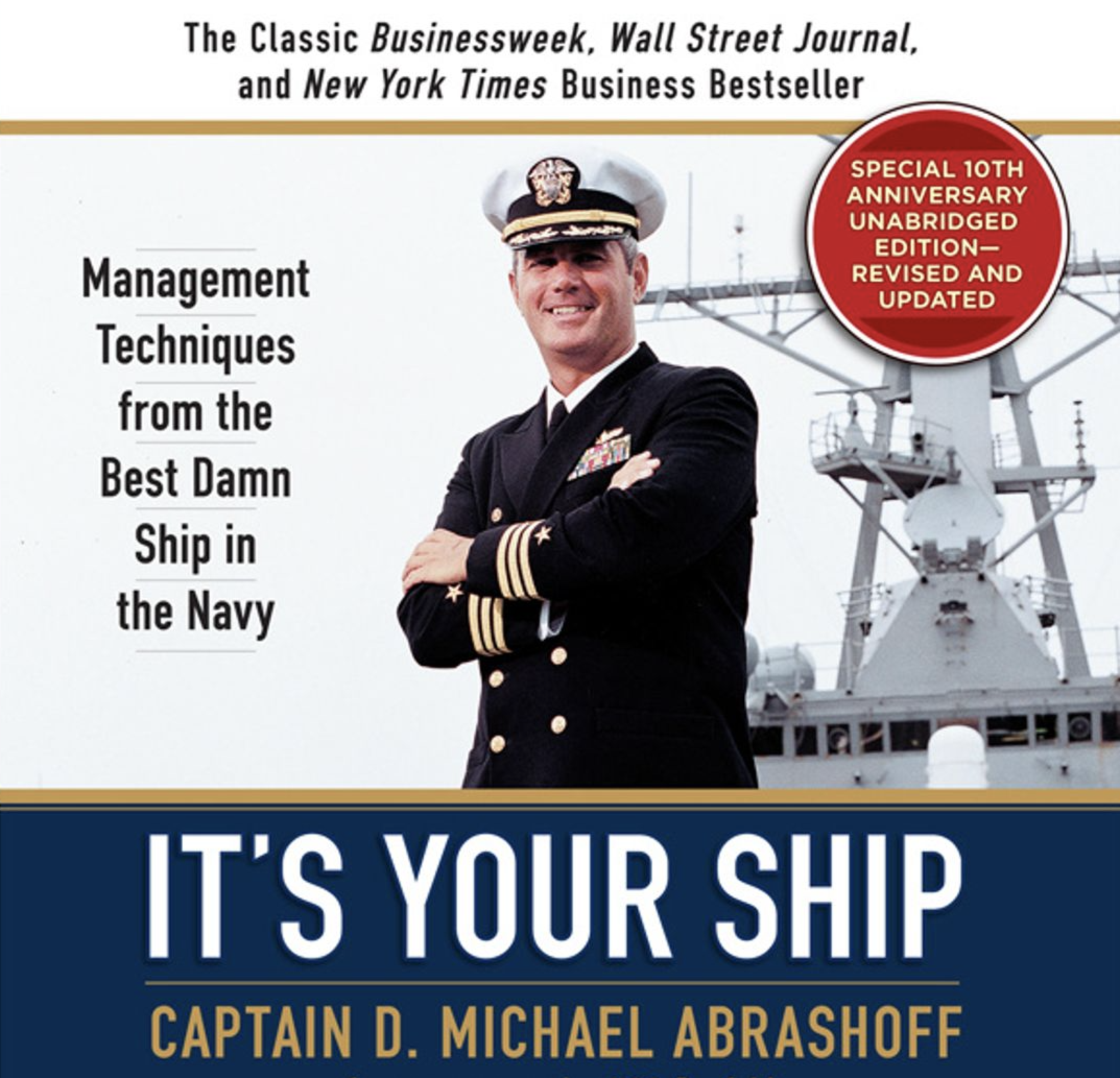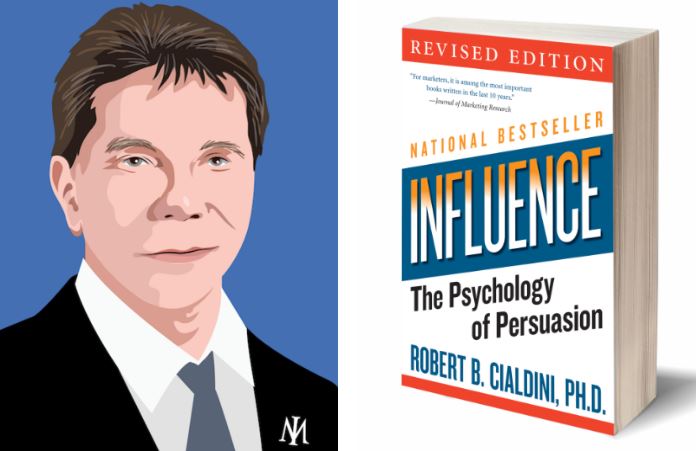You don’t have to search too far to find the many parallels that exist in successful businesses. Leadership, Culture, People; all are examples of things we find time and time again in companies that have stood out from their competition and been both shining lights in their industry and excellent companies to have invested in.
Interestingly, its not only in business that we can find these parallels. Success comes in many forms, and one of the more interesting I’ve discovered was a US Naval Ship. What makes it all the more fascinating is that the military is ordinarily viewed as nothing short of autocratic. Leadership is maintained through the hierarchy of rank; orders are to be followed regardless of how lower ranks regard their superiors. In light of this, how did one man take a Guided Missile Destroyer with a divided and troubled crew, that was regarded as the worst in it’s fleet, and turn it into the best ship in the Navy?
'It’s Your Ship’ is the story of Captain D. Michael Abrashoff, the commanding officer of USS Benfold. The book outlines how, by unconventional means, Abrashoff tapped into the latent human potential aboard Benfold to turn it into the ‘gem of the ocean.’
Peter Kaufman, Chairman and CEO of Glenair, (a business whom Charlie Munger classifies as one of the best three operating companies he’s aware of) recommended his outside directors read the book, along with ‘Plain Talk’ and ‘The Carolina Way.’ Of the three, Kaufman noted, ‘Michael Abrashoff had the toughest hand of all - turning the worst performing ship in the Pacific fleet into the best in the Navy, without changing a single crew member.’
And why should that be relevant to us, as investors? Because business is about people. Management and culture matter. Kaufman explains:
‘Despite widely different fields and completely different circumstances in terms of context, the leadership and cultural principles set forth are virtually the same as ours.’
‘In my experience, a high-morale group, properly motivated and incentivised, can out-perform a low-morale peer group by a factor of 5X or more. The typically untapped, latent potential of human beings is stunning, and can be unleashed by the right cultural framework. Unleashing that latent potential, is how, over three decades, Nucor and Glenair have respectively posted seemingly impossible compounded returns of 17% and 18%, with no losses or layoffs.’
The management techniques deployed and subsequent culture created by Abrashoff are prevalent in the world’s best companies we’ve studied. If you’ve read Thomas Peters, ‘In Search of Excellence,’ accredited by Buffett as “A landmark book; without question the most important and useful book on what makes organisations effective, ever written,” you’ll notice the same examples jump out of almost every page; Empowering employees from the depths of the hierarchy to the top, management walking the floors, full transparency, accepting of mistakes, constant innovation, and questioning conventional wisdom are but a few.
Good investments start with good businesses. It’s often the qualitative aspects that determine success. An analysis of the quantitative data on USS Benfold; crew size, diversity, pay, skill level, won’t shed any light on it’s competency. However, an understanding of management philosophy and culture would have given you a strong sense of likely success. It’s a very useful case study, as unlike companies, it’s possible to compare Benfold’s results with it’s identical sister ships over time.
‘First is you could take pairs of companies at a given moment in history that were very similar. They were similar at the point of start-up, the same environment, the same technologies, same changes and same circumstances, and one became a great company and the other one didn’t.” Jim Collins
Initially, the Benford’s crew retention rate was a dismal 28%. Following Abrashoff taking command, all of Benfold’s career sailors re-enlisted for an additional tour, the ships retention rate for the two most critical categories jumped from 28% to 100% and stayed there.
While the Benford’s results were quantitative, in the sense of metrics like re-enlistment rates, combat readiness, re-fuelling efficiency, the means to achieving the results were qualitative. it wasn’t about more pay, a more highly skilled workforce, or more diversity, it was about leadership, motivating others and unleashing human potential.
The Captain challenged Navy procedure to transform a complex organisation. He improvised techniques to build morale and unity. He created a new environment comprising a company of collaborators who flourished in a spirit of relaxed discipline, creativity, humour and pride. In the process, the USS Benfold went on to beat nearly every metric in the Pacific fleet.
Abrashoff noted that the ship he eventually left to his successor, though once divided and troubled, was all a captain could wish for - the gem of the ocean.
Following are some of the gems from the book:
Mission
“In business terms, I viewed Benfold during it’s Persian Gulf deployment as a very productive company with one major customer - my boss, a three-star admiral in command of the Fifth Fleet. To dominate market share, our ship had to top all others in the categories most important to my customer.”
“By getting very good at both inspecting tankers and shooting cruise missiles, Benfold achieved two coveted areas of expertise. The higher-ups were forever fighting over who got to use our services. That should be the goal of any business; Strive to offer high quality at low cost in versatile areas such that customers fight to place their orders.”
Empower People
“Helping people realise their full potential can lead to attaining goals that would be impossible to reach under command-and-control.”
“I found the more control I gave up, the more control I got. In the beginning, people kept asking my permission to do things. Eventually, I told the crew, ‘It’s your ship. You’re responsible for it. Make a decision and see what happens.’ Hence the Benfold watchword was ‘It’s your ship.’ Every sailor felt that Benfold was his or her responsibility. Show me an organization in which employees take ownership, and I will show you one that beats its competitors.”
“The timeless challenge is to help less talented people transcend their limitations.”
“A ship commanded by a micromanager and his or her hierarchy of sub-micromanagers is no breeding ground for individual initiative.”
“I wanted everyone to be involved in the common cause of creating the best ship in the Pacific Fleet.”
“Empowering people means defining the parameters in which people are allowed to operate, and then setting them free.”
“As I saw it, my job was to create the climate that enabled people to unleash their potential. Given the right environment, there are few limits to what people can achieve.”
“Whenever the consequences of a decision had the potential to kill or injure someone, waste taxpayers’ money, or damage the ship, I had to be consulted. Short of those contingencies, the crew was authorised to make their own decisions. Even if decisions were wrong, I would stand by my crew. Hopefully, they would learn from their mistakes. And the more responsibility they were given, the more they learned.”
“When people feel they own an organisation, they perform with greater care and devotion.”
“I am absolutely convinced that with good leadership, freedom does not weaken discipline - it strengthens it. Free people have a powerful incentive not to screw up.”
“Empower your people, and at the same time give them guidelines within which they are allowed to roam.”
“We empowered our young sailors to assume major responsibilities - including giving calm, expert tours of the ships to VIPs so high on the food chain that officers on other ships would probably stutter in their presence.”
“Unlike some leaders, I prefer to build myself up by strengthening others and helping them feel good about their jobs and themselves. When that happens, their work improves, and my own morale leaps.”
“I think [our sister ships] hit a performance ceiling because they didn’t create a supportive climate that encouraged sailors to reach beyond their own expectations. Ultimately, that was Benfold’s edge.”
Value People
“As the new captain of Benfold, I read some exit surveys, interviews conducted by the military to find out why people are leaving. I assumed that low pay would be the first reason, but in fact it was fifth. The top reason was not being treated with respect and dignity; second was being prevented from making an impact on the organisation; third, not being listened to; and, fourth, not being rewarded with more responsibility. Talk about an eye opener. Further research disclosed an unexpected parallel with civilian life. According to a recent survey, low pay is also number five on the list of reasons why private employees jump from one company to another. And the top four reasons are virtually the same. The inescapable conclusion is that, as leaders, we are all doing the same things wrong.”
“As a manager, the one thing you need to steadily send to your people is how important they are to you. In fact, nothing is more important to you.”
“Be there for your people. Find out who they are. Recognise the effects you have on them and how you can make them grow taller.”
“Shortly after I took command of Benfold, I vowed to treat every encounter with every person on the ship as the most important thing at that moment.”
“I said to myself, ‘The only way I can create the right climate is to tell every sailor, in person, that this is the climate I want to create.’ I decided to interview each crew member on the ship so he or she could hear my expectations directly.'“
“In just about every case, my sailors were not born with anything remotely resembling a silver spoon in their mouths. But each and everyone of them was trying to make something meaningful of their lives. Something happened in me as a result of those interview: I came to respect my crew enormously. No longer were they nameless bodies at which I barked orders. I realised they were just like me: They had hopes, dreams, loved ones, and they wanted to believe that what they were doing was important. And they wanted to be treated with respect.”
“Like any workforce, mine appreciated hearing from top management.”
“Keep talking. Tell everyone personally what’s in store for him or her - new goals, new work descriptions, new organisational structure, and yes, job losses, if that’s the case. Explain why the company is making the changes. People can absorb anything if they are not deceived or treated arrogantly.”
“Benfold’s crew lived and worked by the Golden Rule. We trusted that everyone would be treated with dignity and respect, and we expected no less [from anyone]”
“I wanted everyone on the ship to see one another as people and shipmates.”
“Of course, I treated people with the same dignity and respect I expected of them, and I made sure they truly liked their jobs. Freed from top-down-itis, Benfold’s sailors were given responsibilities to make decisions, correct mistakes, and prove to themselves that they were part of a superb crew.”
“Instead of tearing people down to make them into robots, I tried to show them I trusted them and believed in them. Show me a manager who ignores the power of praise, and I will show you a lousy manager. Praise is infinitely more productive than punishment.”
“The commanding officer of a ship is authorised to hand out 15 medals a year. I wanted to err on the side of excess, so in my first year I passed out 115.”
“Newbies are important, treat them well. I greeted each the same way: ‘Welcome .. I appreciate having you on our ship.’ All too often, a gung-ho newcomer runs smack into a poisoned corporate culture that sucks the enthusiasm right out of her. I wanted the newcomers to remain so revved up that they would recharge the batteries of those who no longer felt that way.”
“Try to make the people who work for you feel needed and highly valued. Help them believe in that wonderful old truism, ‘A rising tide lifts all boats.’ With perhaps few exceptions, every organisation’s success is a collective achievement.”
Low End Of The Hierarchy
“Breaking out of our stratified systems to trust the people who work for us, especially those at or near the low end of the hierarchy, was a useful, progressive change.”
“How much brainpower does the Navy - or any organisation, for that matter - waste because those in charge don’t recognise the full potential hiding at the low end of the hierarchy. If we stopped pinning labels on people and stopped treating them as if they were stupid, they would perform better. Why not instead assume everyone is inherently talented, and then spur them to live up to those expectations? Too idealistic? On the contrary, that’s exactly how Benfold became the best damn ship in the Navy.”
Walk the Floors - No Ivory Tower
“The key to being a successful skipper is to see the ship through the eyes of the crew. Only then can you find out what’s really wrong and, in so doing, help the sailors empower themselves to fix it.”
“It seemed to me only prudent for the captain to work hard at seeing the ship through the crew’s eyes. My first step was trying to learn the names of everyone onboard. It wasn’t easy. Try attaching 310 names to 310 faces in one month.”
“I tried to establish a personal relationship with each crew member.”
“Knowing my people well was a huge asset.”
“We used every possible means of communication, including private email to key superiors; daily newsletters for the crew; my own cheerleading for good ideas and walking around the ship chatting.”
“I started eating at least one meal per week on the mess decks with the crew. It paid big dividends; I learned a great deal and got to know people that way, and after a while my officers began taking occasional meals there, too.”
“Many leaders almost never leave their office. Recall how you feel when your boss tells you, ‘Good job.’ Do your people (and yourself) a favour. Say it in person, if you can. Press the flesh. Open yourself. Coldness congeals. Warmth heals. Little things make big successes.”
“Gestures such as joining the enlisted people at cookouts [on the ship’s deck], having lunch once a week with the crew on the mess decks, and making sure visiting VIP’s got to talk to the crew, I tried to show the officers that in human terms we were all in this together, and each person was indispensable to the unity of the Benfold team.”
“When I can build people up, their work improves, and my morale leaps. My approach with the cooks was to walk through the galley just about every other day, telling them how much I appreciated their hard work. And the food got a lot better.”
Reciprocation
“The more I went around meeting sailors, the more they talked to me openly and intelligently. The more I thanked them for hard work, the harder they worked. The payoff in morale was palpable.”
Tone From The Top
“A leader will never accomplish what he or she wants by ordering it done. Real leadership must be done by example, not precept. Whether you like it or not, your people follow your example.”
“Leaders need to understand how profoundly they affect people, how their optimism and pessimism are equally infectious, how directly they set the tone and spirit of everyone around them.”
“It is well known that every leader sets the tone for his or her organisation. Show me an enthusiastic leader, and I will show you an enthusiastic workforce.”
“In desperate times I always grabbed the microphone to communicate. Your people want to hear it from the top that everything is going to be all right after all. In times of peril, people always turn to the guy at the top and look for guidance.”
“When I took command of Benfold, I saw a crew of 310 men and women with untapped talent, untested spirit and unlimited potential. I was determined to be the captain these sailors deserved.”
Purpose
“The whole secret of leading a ship or managing a company is to articulate a common goal that inspires a diverse group of people to work hard together. That’s what my sailors got: a purpose that transformed their lives and made Benfold a composite of an elite school, a lively church, a winning football team, and - best of all - the hottest go-to-ship in the US Navy.”
Generate Unity
“Generate unity. I substituted [the diversity training] for unity training, concentrating on people’s likeness and our common goals rather than differences.”
“If you surround yourself with people exactly like yourself, you run the dangerous risk of groupthink, and no one has creativity to come up with new ideas. The goal is not to create a group of clones, culturally engineered to mimic one another. Rather, unity is about maximising uniqueness and channeling that toward the common goal of the group."
“Unity of purpose is quite achievable, even against heavy odds, and sometimes because of them. We created unity on Benfold.”
Transparency
“Some leaders feel that by keeping people in the dark, they maintain a measure of control. But that is a leader’s folly and an organisation’s failure. Secrecy spawns isolation, not success.”
“As I rose through the ranks in the Navy, I was continually frustrated by how information was stopped at mid-level regions.”
USS Benfold
Common Sense
“The art of leadership lies in simple things - common sense actions that ensure high morale and increase the odds of winning.”
Little Things
“Little things make big successes. Within a couple of months of my taking over, other ship commanders began visiting Benfold to find out how we were getting our sailors to work so well. I was delighted to share all our secrets. They were hardly profound; mainly, we were attentive to people’s feelings and potential. A lot of seemingly small gestures added up to a friendly and supportive atmosphere.”
Innovation & Ideas
“Organisations should reward risk-takers, even if they fall short once in a while. Let them know that promotions and glory go to innovators and pioneers, not to stand-patters who fear controversy and avoid trying to improve anything. To me, that’s the key to keeping an organisation young, vital, growing, and successful. Stasis is death to any organisation. Evolve or die: It’s the law of life.”
“I began with the idea that there is always a better way to do things, and that, contrary to tradition, the crew’s insights might be more profound than even the captain’s. Accordingly, we spent several months analysing every process on the ship. I asked everyone, ‘Is there a better way to do what you do?’. Time after time, the answer is yes, and many of the answers were revelations to me.”
“I decided my job was to listen aggressively and to pick up every good idea the crew had for improving the ship’s operation. After all, the people who do the nuts-and-bolts work on the ship constantly see things that officers don’t.”
“Innovation knows no rank. Good ideas are where you find them - even on the fo’c’sle. My officers were ready to discard a great idea because it came from a lowly enlisted man. Fortunately, I happened to overhear his recommendation. Every leader needs big ears and zero tolerance for stereotypes.”
“In my interviews with the crew, I got feedback in ways I never imagined. After we implemented the lower deck’s ideas on how to improve the way we did business, the ship’s energy began heating up.”
“Innovation and progress are achieved only by those who venture beyond Standard Operating Procedure. You have to think imaginatively, but realistically, about what may lie ahead, and prepare to meet it.”
Creativity
“The management committee always wants to see metrics before they allow you to launch new ideas. Since, by definition, new ideas don’t have metrics, the result is that great ideas tend to be stillborn in most companies today.”
“If I had been forced to chart a course defined by metrics, the creativity we sparked and the changes we achieved probably could not have happened.”
“Rigidity gets in the way of creativity. Instead of salutes, I wanted results, which to me meant achieving combat readiness. The way to accomplish this was not to order it from the top, which is demoralising and squashes initiative. I wanted sailors to open their minds, use their imaginations, and find better ways of doing everything. I wanted officers to understand that ideas and initiative could emerge from the lower deck as well as muscle and obedience.”
Seek and Accept Input
“Let your crew feel free to speak up. I was determined to create a culture where everyone on board felt comfortable enough to say to me, ‘Captain, have you thought of this?’ or ‘Captain, I’m worried about something,’ or even ‘Captain, I think you’re dead wrong and here’s why.’ Yes-people are a cancer in any organisation, and dangerous to boot.’
“After every major decision, event, or maneuver, those involved gathered around my chair on the bridge wing and critiqued it. Even if things had gone well, we still analysed them. Sometimes things go right by accident, and you are left with the dangerous illusion that it was your doing.”
“There was no retribution for any comments. I encouraged people to challenge or criticise anyone in the group; the most junior seaman could criticise the commanding officer.”
“If I was causing [the crew] unnecessary work, then I wanted to know about it. If the crew had a problem with what I was doing, I wanted them to tell me so I could fix it or explain why I had to do things that way, thus expanding my crew’s knowledge of the limitations or requirements imposed on me.”
“When people saw me opening myself to criticism, they opened up themselves. That’s how we made dramatic improvements. People could get inside one another’s mind. They could work together for the best possible Benfold. The result? We never made the same mistake twice, and everyone got to understand the big picture.”
“Even when the reluctance to speak up stems from admiration for the commanding officer’s skill and experience, a climate to question decisions must be created in order to foster double-checking.”
“Make your people feel they can speak freely, no matter what they want to say. If they see that the captain wears no clothes, facts are facts and deserve attention, not retribution.’
Multi-Skill
“In the current squeeze on business costs, many companies have cut back so much that they are only one-deep in critical positions, leaving no margin for error. My goal was to cross-train in every critical area.”
“There is no downside to having employees who know how every division of an organisation functions. The challenge is finding incentives to motivate them to want to do so.”
“Build a strong, deep bench. Cross-training became our mantra. We had young sailors, barely out of boot camp, doing the jobs of first-class petty officers with several hash marks, and doing them well.”
Bad News
“It’s critical that leaders don’t shoot the messenger who brings bad news. A boss who does will not hear about future problems until they are out of hand.”
“Bad news does not improve with age. The longer you wait, the less time your boss has to help you come up with a solution.”
“It’s been my experience in management that while good news makes you feel warm inside, it’s the negative news that makes you learn and helps improve your performance on the job.”
Unconventional
“At first, my unconventional approach to the job evoked fear and undermined authoritarian personality that had been imprinted on the ship. But instead of constantly scrutinising the members of my crew with the presumption they would screw up, I assumed they wanted to do well and be the best.”
“My sailors were free to question conventional wisdom and dream up better ways to do their jobs.”
“As captain, I was charged with enforcing 225 years of accumulated Navy regulations, policies, and procedures. But every last one of those rules was up for negotiation whenever my people came up with a better way of doing things.”
“You will seldom get in trouble for following Standard Operating Procedure. On the other hand, you will rarely get outstanding results. And all too often, SOP is a sop - it distracts people from what’s really important.”
Have Fun
“I focused my leadership efforts on encouraging people to not only find better ways to do their jobs, but also to have fun as they did. And sometimes - actually, a lot of times - I encouraged them to have fun for fun’s sake.”
“When I interviewed my sailors, I asked them not only how we could improve the ship’s performance, but also how we could have fun at work. The responses were amazing.”
“We tried to instill fun in everything we did, especially mundane, repetitive jobs such as loading food aboard the ship.”
“The point was that having fun with your friends creates infinitely more social glue for any organisation than stock options and bonuses will ever provide.”
“The secret to good work? Good play. We were the offbeat ship that wasn’t afraid to loosen up, make the best of what had to be done, and share fun with everyone. Giving our people the freedom to act a little crazy seemed to confirm that we really cared about them.”
“This shows what you can accomplish when you throw formality to the winds and free your people to have a life on your time, which soon becomes the time of their lives. None of this required big money, only imagination and goodwill. On USS Benfold, the secret of good work was good play.”
Accept Mistakes
“I’d like to live in a culture that allows people to candidly acknowledge mistakes and take responsibility. It’s far more useful to focus on making sure the accident never happens again rather than finding someone to blame.”
“Unfortunately, organisations all too often promote only those who have never made a mistake. Show me someone who has never made a mistake, and I will show you someone who is not doing anything to improve your organisation.”
Freedom to Fail
“I worked hard to create a climate that encouraged quixotic pursuits and celebrated freedom to fail.”
Ethics
“I was always careful never to take any ethical shortcuts.”
“I just asked myself this: If what I’m about to do appeared on the front page of the Washington Post tomorrow, would I be proud or embarrassed? If I knew I would be embarrassed, I would not do it. If I’d be proud, I knew I was generally on the right track.”
Bureaucracies
“More often than not, bureaucracies create rules and then forget why they were needed in the first place, or fail to see the reasons for them to no longer exist. When it comes to purging outdated regulations, bureaucracies are sclerotic.”
Continual Learning
“I was determined to turn the ship into an institution of continual learning.”
Competition
“I didn’t consider [the other ships in the fleet] rivals.; I didn’t have any rivals. I was in competition only with myself, to have the best ship we possibly could.”
Conclusion
The characteristics that defined USS Benfold’s success weren’t quantitative. They were qualitative and they were all about people. The physical asset, the ship, was no different to any other in the fleet; it was the people that made all the difference. In a similar fashion, most businesses are defined by their people, too. Investigating the philosophies, values and culture that permeate a business, it’s management and people can provide the clues to it’s ultimate success.
From an investing standpoint I’ve always been cautious of investing in business turnarounds. The base-rates are too low for my liking. Captain Abrashoff’s book got me thinking that just maybe, with the right approach, success in a turnaround can be more easily gauged.
Ultimately, this is a book about humanity and the psychological forces that drive people to work together and achieve. Captain Abrashoff leveraged the levers that drive group output to achieve outstanding performance, regardless of the fact he was on a naval ship. The lessons contained within are not only relevant to the military, they are integral to the success of any business, and more importantly those that we either are or are wanting to, invest in.
Given our daily interactions with people and society, we can all learn from Captain Abrashoff.


















